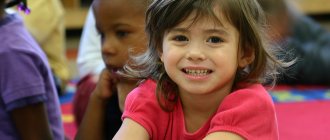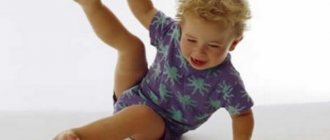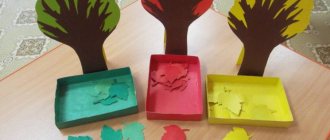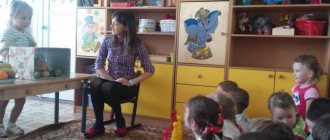Features of the process of self-education on the topic “Environmental education”
Self-education is a continuous process aimed at the professional growth of a teacher, as well as at expanding general cultural and educational horizons. In kindergarten, familiarization with methodological developments and their implementation in the practice of work of preschool groups is a prerequisite for successful professional activity. The Federal State Educational Standard has determined a basic list of topics for self-education of teaching staff in kindergartens, which varies depending on the age of the students. This list includes a block of problems related to cultivating a conscious, caring attitude towards nature:
- Formation of the beginnings of the ecological culture of preschool children.
- Environmental education of children in kindergarten.
- Ecological development of children in preschool institutions.
- Development of environmental education of preschool children through didactic games.
- The influence of environmental education on the spiritual development of a preschooler’s personality.
Topics related to environmental education are studied throughout the school year. Subsequent topics of self-education can be related to the previous one, for example, from the generalized version “Environmental education in kindergarten” to the more specific “Development of environmental education for preschoolers through didactic games.” Or, conversely, from the particular to the general.
You can learn more about environmental education from our article - Environmental education of preschoolers in kindergarten.
The development of topics on environmental education during the work of a teacher in kindergarten can go from general to specific or vice versa
Relevance of the topic
To work on the chosen issue of self-education, it is necessary to formulate the relevance of the problem. The importance of considering the issue of environmental education in the work of teachers of different age groups will be argued in the same way, since the timeliness of studying the topic is determined by the development of the child’s personality as a whole. However, some specific points will be clarified depending on the age of the students.
- Formation of an emotionally responsive personality.
- Close connection with the education of morality, including mercy, empathy, kindness through caring for the environment, that is, caring for representatives of flora and fauna.
- Joint observation with children, analysis of what they saw, heard and entertaining games allow us to form ideas about the meaning of living and inanimate nature for each person. At this point it would be appropriate to indicate which observations and games are used in working with a specific age group.
Observations, experiments, creative tasks - this is what forms the basis of work on environmental education of children
- Different methods and techniques of work (indicate which ones for a specific age) also create conditions for the formation of aesthetic and moral qualities of a person, a citizen capable of protecting not only the fatherland, but also everything that nature has created.
This is interesting. Outstanding Soviet teacher V.A. Sukhomlinsky said: “Perhaps children cannot yet comprehend nature as a national property, let them understand it as a twig on which there is a nest where we, the chicks of nature, live.”
V.A. Sukhomlinsky
Goals and objectives of teacher self-education on the topic of environmental education
The Federal State Educational Standards formulated the goals of self-education on the topic of ecology:
- Organization of the process of instilling personal responsibility for the state of the environment.
- Formation of the foundations of a culture of nature-conforming behavior in preschoolers.
- Development of skills for rational interaction of children with the environment.
- Awareness by the younger generation of themselves as part of nature.
- Involving the family in the work of nurturing a culture of natural behavior in the child.
To achieve these goals, the teacher must solve the following tasks:
- replenish your methodological collection with new information regarding the chosen topic;
The teacher must become familiar with new methodological literature, which is published in various sources: books, periodicals, the Internet.
- make a card index of educational games, walks, lesson notes and entertainment activities on the topic for your group;
- work on creating an ecological corner in a group;
- engage in environmental education of children and their parents.
The presented goals and objectives, like the topics, are a generalized version, while each age group has its own characteristics.
The work system is carried out according to the principle of a pyramid: new knowledge, skills and abilities are built on top of existing ones, that is, mastered last year.
Table: topics, goals and objectives of self-education on the topic for different age groups
| Age group | Specifics of choosing a topic | Goals | Tasks |
| Junior (first, second) | The emphasis is on developing a system of didactic games for this age. |
|
|
| Average | The emphasis is on enhancing cognitive activity in children. |
|
|
| Older | Emphasis on expanding the range of knowledge regarding the flora and fauna of the native land (connection with patriotic education). |
|
|
| Preparatory | Emphasis on learning the rules of behavior in nature, familiarity with the visible phenomena of the Universe, as well as consideration of the importance of water in our lives. |
|
|
Self-education plan for 5 years on the topic “Development of sensorimotor skills in preschool children”
Self-education plan
Individual work plan for teacher Natalya Vladimirovna Kaukanova
The period of work on the topic is five years (from 2020 to 2020)
Start of work on the topic December 2020.
Self-education is the purposeful work of a teacher to expand and deepen his knowledge, improve existing ones and acquire new professional skills.
Self-education topic:
“Development of sensorimotor skills in preschool children”
Target:
the formation of sensory standards in preschool children, the development of perception and the formation of ideas about the external properties of objects: their shape, size, color, position in space. Development of fine motor skills and sensory perception in preschool children.
Tasks:
1. Study literature on the topic of self-education.
2. Develop a long-term plan for the topic being studied for the academic year.
3. Get acquainted with innovative methods and technologies in the ICT environment.
4. Formation of basic key competencies and research abilities in preschoolers.
5. Organize work with educators on consultation on the topic “Joint work of educators on the development of sensory and fine motor skills in children of primary preschool age in an object-based game form”
6. Take part in a seminar, methodological association.
7. Conducting an open lesson for teachers on the topic.
8. Create as much didactic material and didactic games as possible.
9. With the help of didactic games, arouse interest in sensory development activities that affect the sensory development of children.
10. Formation of sensory standards. Formation of ideas about the external properties of objects.
Explanatory note
The main task of primary education and upbringing of children of early preschool age is the formation of sensory standards. Strength and automation of knowledge are achieved when the classes contain game exercises and situations that help children unnoticed to perform these exercises with interest, which plays an important role in the formation of knowledge, skills and abilities.
A child’s sensory development is the development of his perception and the formation of ideas about the external properties of objects: their shape, size, color, position in space. It is early preschool age that is most favorable for improving the activity of the senses and accumulating ideas about the world around us.
Sensory development, on the one hand, forms the foundation of the child’s overall mental development and at the same time has independent significance, since full perception is basic for the successful mastery of many types of activities. By the end of preschool age, normally developing children should develop a system of sensory standards and perceptual actions as a result of properly organized training and practice. In children with developmental problems, as a rule, their formation is difficult, and perception is characterized by insufficient accuracy and flexibility. Many children with developmental problems have insufficient motor skills: stiffness, poor coordination, incomplete range of movements, impaired volition; underdevelopment of fine motor skills and hand-eye coordination: awkwardness, uncoordinated hand movements. Such children get tired quickly and have reduced performance, which is largely due to physical underdevelopment.
Self-education report “Development of sensory abilities of children of primary preschool age”
0000Self-education report
“Development of sensory abilities of children of primary preschool age”
In the 2016-2017 academic year, I took the topic of self-education: “Development of sensory abilities of children of primary preschool age.”
The development of sensory abilities is the most important topic in the comprehensive development of children. It is this age that is most favorable for improving the functioning of the senses and accumulating ideas about the world around us. Sensory education, aimed at ensuring full sensory development, is one of the main aspects of preschool education. Goals:
Increasing your theoretical level, professional skills and competence on this topic.
Objectives:
- Study the literature on this topic; - develop and improve all types of perception in preschool children, enrich their sensory experience. - develop tactile perception, namely tactile sensations of pupils. — increase parents’ level of knowledge on sensory development and education of preschool children.
A child’s sensory development is the development of his perception and the formation of ideas about the external properties of objects: their shape, color, size, position in space, as well as smell, taste, etc.
The importance of sensory development in early and preschool childhood is difficult to overestimate. It is this age that is most favorable for improving the functioning of the senses (vision, hearing, touch, smell, taste), and accumulating ideas about the world around us.
It is possible to define the essence of the concept of “sensory education”, which refers to purposeful, consistent and planned pedagogical influences that ensure the formation of sensory cognition in a child, the development of his processes of sensation, perception, visual representations through familiarization with human sensory culture.
The main methods of sensory development of young children are examination of the subject; the main forms are: didactic games, educational activities.
In order for didactic games and educational activities to give a positive result in their organization, it is also necessary to take into account general didactic principles.
the principle of systematicity and consistency, which consists in the fact that a system of scientific knowledge is created in the sequence that is determined by the internal logic of the educational material and the cognitive capabilities of children;
- the principle of accessibility, which follows from the requirements developed by centuries-old teaching practice, on the one hand, the patterns of age-related development of children, the organization and implementation of the didactic process in accordance with the level of development of children, on the other. That is, take into account the individual and age characteristics of children.
- the principle of strength, which enshrines empirical and theoretical laws: mastering the content of education and developing cognitive powers are two interrelated aspects of the learning process;
The richness of the child's environment is crucial for a child's cognitive development.
It is advisable that the child be surrounded by toys made of various materials - wood, stone, clay, metal, fabrics of different textures, etc., and preference should be given to natural materials and objects. Playing with sand and water is of great importance at this age, when the child has the opportunity to pour and pour from one container to another; various moving toys; toys for constructing a series in ascending and descending order: pyramids, nesting dolls, etc.; toys that use different sound production principles; homemade whistling, noisy, rattling, creaking, rustling objects. Don’t forget about construction sets, mosaics, various visual materials (paper of different textures, densities and colors, plasticine, wax, paints, pencils, felt-tip pens, crayons, etc.). Manual labor promotes sensorimotor skills - consistency in the work of the eyes and hands, improving coordination of movements, flexibility, and accuracy in performing actions. Working with natural materials has a great influence on the child’s mental development and his thinking.
The development of games with natural materials cannot be carried out using the same once and for all established techniques and methods. It should be carried out in a variety of ways, using techniques that take into account the development of each child.
When starting to work on this topic, I used the literature: 1. Wenger L. A., Pilyugina E. G. Nurturing a child’s sensory culture: a book for kindergarten teachers. -M. Enlightenment, 1998-144p. 2. Pilyugina V. A. Baby’s sensory abilities: Games to develop the perception of color, shape, size in young children. – M: Education, 1996 – 112 p. 3. Dvorova I.V., Rozhkov O.P. Exercises and classes on sensory education of children 2-4 years of age. – MPSI Modzh, 2007 4. Yanushko E. A. Sensory development of young children. – M, ; Mosaic - synthesis, 2009-72 p. 5. Scientific and methodological journal “Preschool education”.
As a result of studying the literature, I made the following conclusions: the sensory development of a child is the key to his successful implementation of various types of activities and the formation of various abilities. Therefore, sensory education should be systematically and systematically included in all moments of the baby’s life.
Contents of work on self-education on the topic “development of sensory abilities of children 2-3 years old for the 2016-2017 school year. year"
| Month | Subject | Contents of work for 2016-2017 | Practical activities |
| Theoretical stage | Studying methodological literature on this topic. Literature used E.A. Hiltunen “Kindergarten according to the Montessori system. Methodological recommendations for teachers | Consultation for parents on the topic: Development of sensory abilities of children 2-3 years old. |
| Theoretical stage | Studying the experience of kindergarten teachers at Romashka on this topic. Review of didactics. games, manuals, toys (nursery groups). | Consultation for parents on the topic: “The importance of games and exercises for the development of small arm muscles in children.” |
| Practical stage | Creating a subject-development environment in the group | Availability of games and manuals for children on sensory development. |
| Practical stage | Teaching children the rules of playing with didactic toys (showing, explaining, joint and individual activities.) Involving parents in the production of new didactics. benefits, toys for children. | Children's games in the didactic corner, with did. with a toy together with the teacher. |
| Practical stage | Teaching children the rules of did. games (joint activity of the teacher and the child). Making a didact by the teacher. games for children. | Children's games in the didactic corner, with did. materials made by the teacher. |
| Practical stage | Playing with children with sand, finger painting, (palms), games with cereals, beans and peas, massage balls. | Recommendations for parents for the development of fine motor skills in children in everyday life (wet palms - sand paths, games - exercises with massage balls. (individual and subgroup work). |
| 7.May | Practical stage | Analysis of work on this topic during the academic year | Summing up by the teacher about children’s knowledge of the development of sensory abilities at the age of 2-3 years. |




